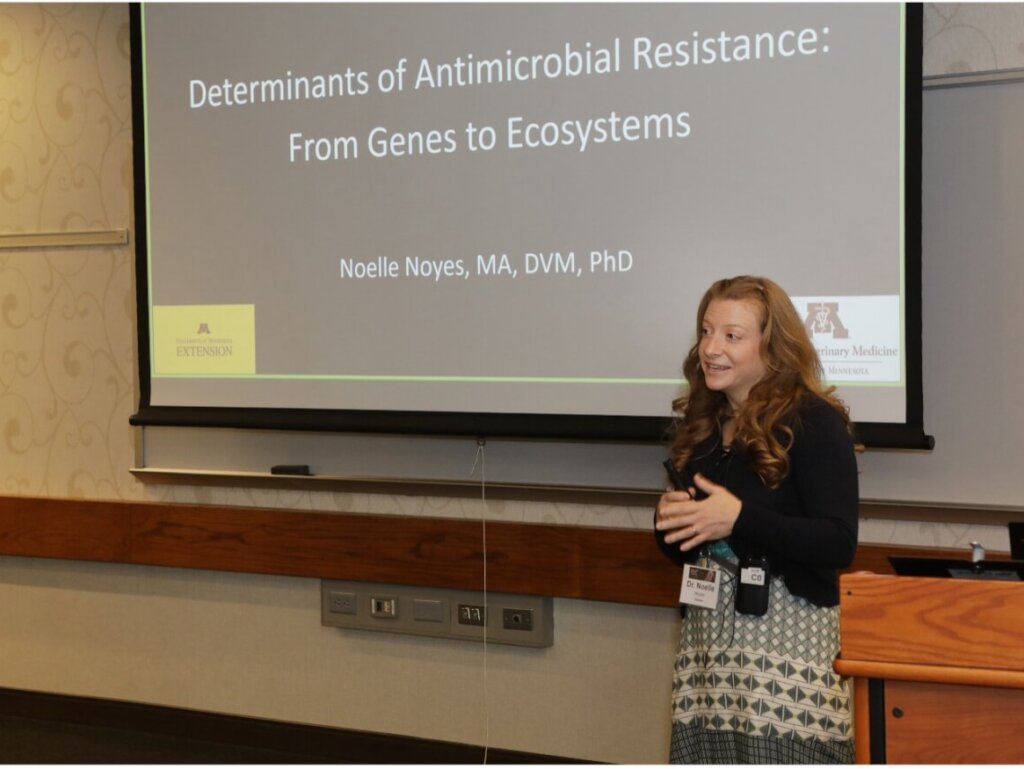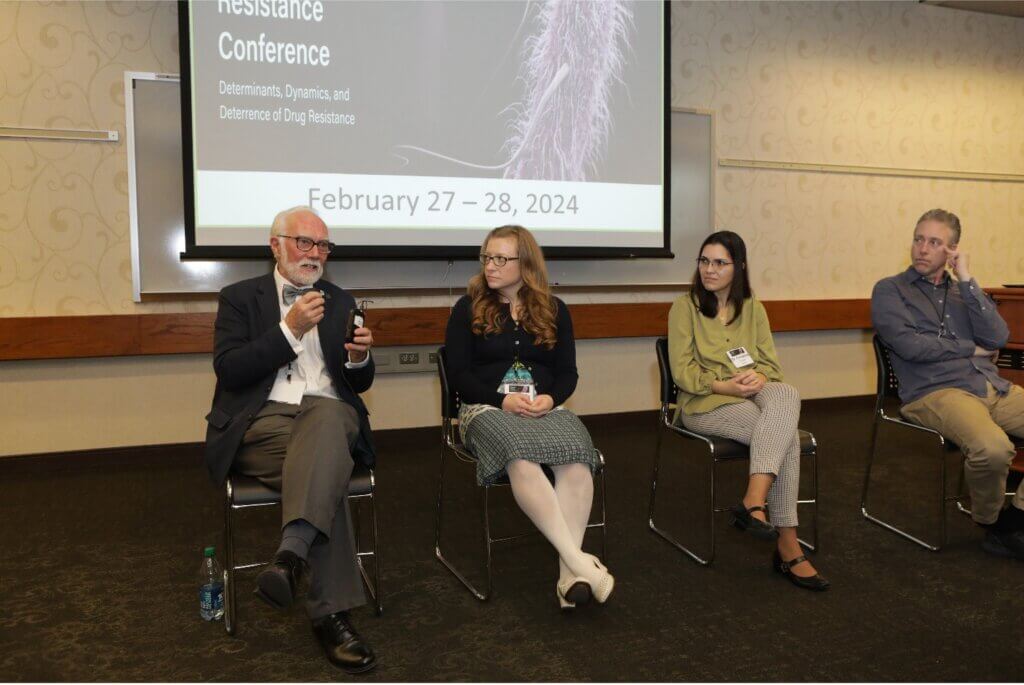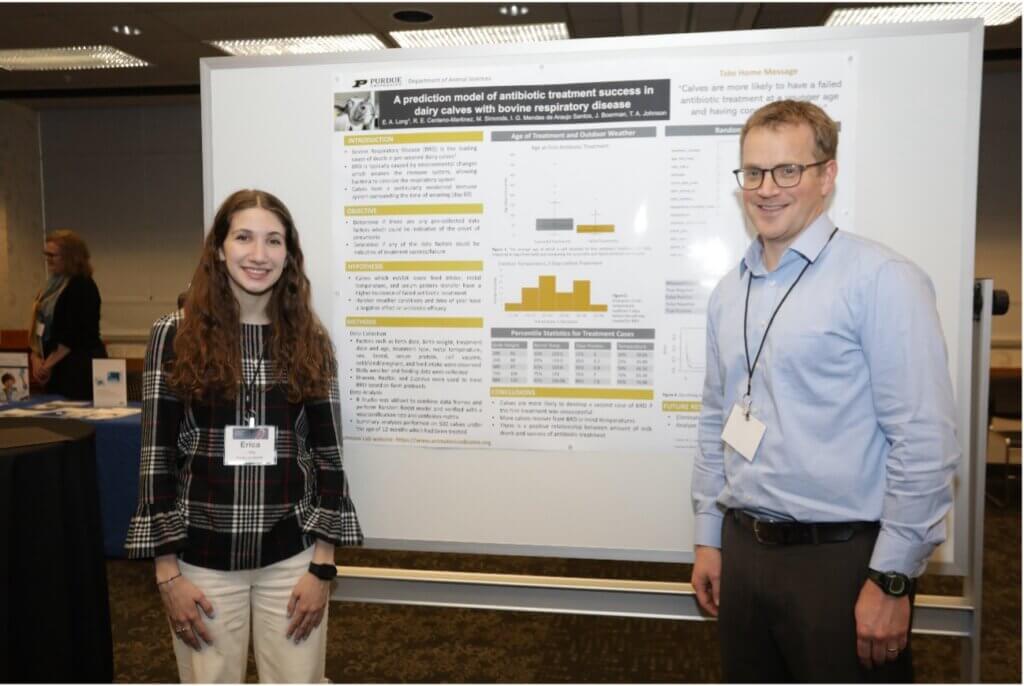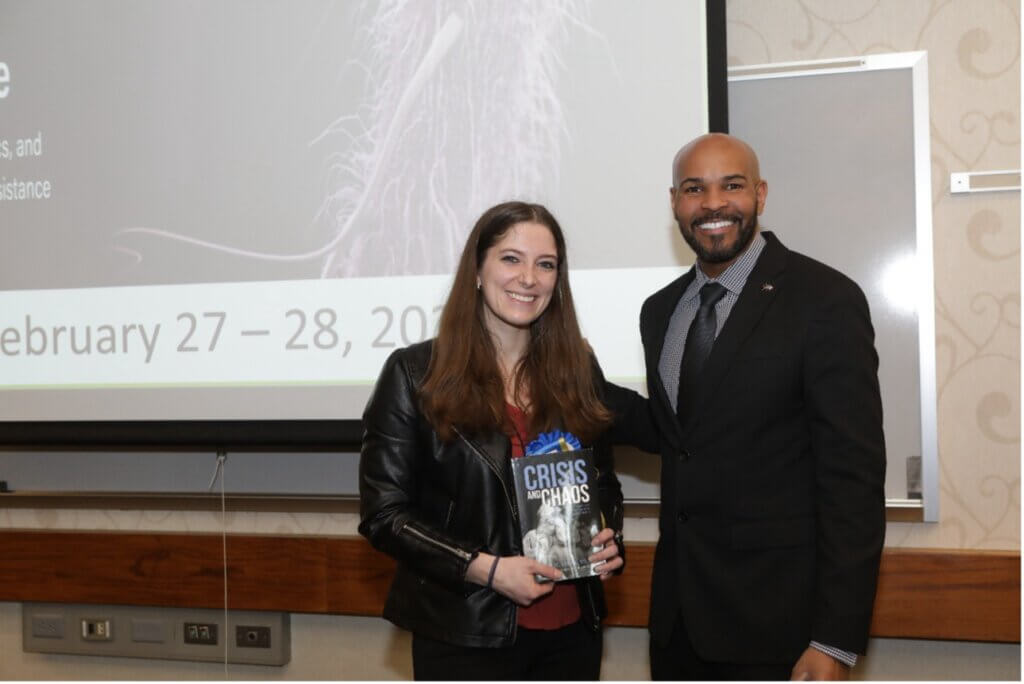
Purdue University’s second Antimicrobial Resistance Conference generated increased attendance this year, reflecting heightened interest in the event’s interdisciplinary approach to the topic that the World Health Organization (WHO) identifies as one of the top global public health and development threats. The conference featured distinguished keynote speakers and Purdue scholars from a variety of disciplines who shared the latest research findings and insights regarding the challenges posed by antibiotic resistance.
Hosted collaboratively by the Colleges of Veterinary Medicine, Agriculture, Science, and Pharmacy February 27-28 at Stewart Center on the Purdue Campus, the conference included presentations by three keynote speakers and nine Purdue University researchers with expertise on the topic of Antimicrobial Resistance (AMR). According to WHO, it is estimated that AMR was directly responsible for an estimated 1.27 million global deaths in 2019 and contributed to 4.95 million deaths. WHO explains that AMR occurs when bacteria, viruses, fungi and parasites no longer respond to antimicrobial medicines, thus rendering antibiotics and other antimicrobial medicines ineffective and making infections difficult or impossible to treat.
Attendance figures for the Purdue Antimicrobial Resistance Conference showed that interest is growing and spreading beyond U.S. borders. This year the conference attracted more than 100 in-person attendees as well as virtual attendees from Canada, Ethiopia, Japan, and Uruguay.

The Conference program focused on three critical aspects of AMR: Determinants, Dynamics and Deterrence. Each focus area was addressed by a keynote speaker who was followed by three Purdue scholars doing research in the specific area. Each segment concluded with a question-and-answer session with a panel consisting of the speakers.
The keynote speaker for the conference’s first segment on Determinants was Dr. Noelle Noyes, associate professor in the Department of Veterinary Population Medicine at the University of Minnesota, who addressed the topic, “Determinants of Antimicrobial Resistance: From Genes to Ecosystems.” She was followed by Dr. Mark Hall, Purdue associate professor of biochemistry; Dr. Cristina Ferreira, metabolomics analyst at Purdue University’s Bindley Bioscience Center, who specializes in Lipidomics by Mass Spectrometry; and Dr. Paul Robinson, the Distinguished Professor of Cytometry in the College of Veterinary Medicine’s Department of Basic Medical Sciences, and Professor of Biomedical Engineering in the Weldon School of Biomedical Engineering.
The second segment, focusing on Dynamics, featured a keynote presentation by Dr. Paul Plummer, associate professor of veterinary diagnostic and production animal medicine at Iowa State University, who gave a talk entitled, “The complex dynamics of AMR and its Impact on One Health and policy.” He was followed by a trio of Purdue speakers: Dr. Tingting Ju, assistant professor of animal sciences; Dr. Ilya Slizovskiy, Purdue Veterinary Medicine assistant professor of antimicrobial resistance/farm animal medicine; and Dr. Paul Ebner, professor and interim head of the Department of Animal Sciences.
The third segment of the conference dealt with the topic of Deterrence. Dr. Elizabeth Dodds-Ashley, associate professor of medicine in the Division of Infectious Diseases and International Health at Duke University, gave a keynote lecture entitled, “Deterring Drug Resistance, an overview of current US strategies in place to stem the tide of antimicrobial resistant infections.” She was followed by Dr. Daniel Flaherty, associate professor of medicinal chemistry and molecular pharmacology; Kinnari Arte, a PhD graduate student working with Associate Professor Qi “Tony” Zhou in the College of Pharmacy’s Department of Industrial and Molecular Pharmaceutics; and Dr. Alexander Wei, professor of Organic Chemistry.

In addition to the lectures, the conference included a Poster Competition that attracted entries from 15 Purdue undergraduate students, graduate students and postdocs who highlighted research they are doing in labs on the Purdue campus and in one case, at the University of Notre Dame. During a reception at the conclusion of the first day of the conference, attendees had the opportunity to peruse the posters and visit with the poster presenters.
The conference concluded with a talk by Dr. Jerome Adams, the 20th US Surgeon General who now serves as a Purdue presidential fellow and the executive director of Purdue’s Health Equity Initiatives. Dr. Adams discussed how the looming threat of antimicrobial resistance is not merely a distant concern, confined to the realm of hypotheticals, but an imminent reality that demands our immediate attention and concerted action. “As we grapple with the aftermath of the pandemic, we must recognize the urgency of addressing AMR and the vital role that a One Health approach brings to tackling this complex challenge,” Dr. Adams said.

Following his talk, Dr. Adams presented the prizes to the Poster Competition winners. Awards were given in two divisions. In the Undergraduate Division, Animal Sciences undergraduate student Erica Long won for her poster entitled “A prediction model of antibiotic treatment success in dairy calves with bovine respiratory disease.” In the other division, which was for graduate students, the first-place prize went to Molly Youse, a graduate student in the Borch Department of Medicinal Chemistry and Molecular Pharmacology for her poster entitled, “Development of Carbonic Anhydrase Inhibitors for Drug Discovery against Neisseria gonorrhoeae.” Josiah Davidson, a graduate research assistant in Agriculture and Biological Engineering was awarded the 2nd place prize for his poster entitled, “Nucleic Acid-based Detection of Viruses Associated with Respiratory Disease in Humans and Animals on Paper.” In presenting the awards, Dr. Adams included with the cash prizes a copy of his recently published book, “Crisis and Chaos.”
The conference was sponsored in part by Qiagen and Integra who had representatives on-site to demonstrate their lab equipment and products for the attendees.

